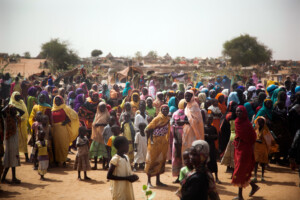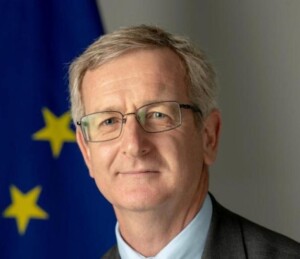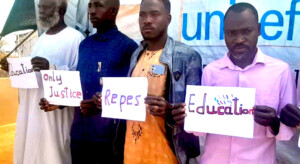Peace Shield Forces deployed in North Darfur as attacks continue
On Sunday, one person was killed, another wounded, and three kidnapped in two separate attacks in Tawila locality, North Darfur. The North Darfur State Security Committee will deploy the Peace Shield Forces in certain localities to deal with the lack of security. Experts from the UN Human Rights Council urged the Sudanese government to take urgent action to protect civilians in Darfur.
 The Peace Shield Forces will consist of RSF troops (SUNA)
The Peace Shield Forces will consist of RSF troops (SUNA)
On Sunday, one person was killed, another wounded, and three kidnapped in two separate attacks in Tawila locality, North Darfur. The North Darfur State Security Committee will deploy the Peace Shield Forces in certain localities to deal with the lack of security. Experts from the UN Human Rights Council called on the Sudanese government to take urgent action to protect civilians in Darfur.
Witness Hasan Adam told Radio Dabanga that gunmen with cars and camels attacked the village of Barakarou in Tawila, injuring Mohieldin Suleiman (42) and kidnapping Yusef Hamid (18), Yahya Idris (22), and Abdelbaqi Hamed (30). They were forced into a vehicle at gunpoint and taken to an unknown location.
In the village of Garagou, other gunmen killed Adam Haroun, stole 179 cows, and looted property in the village.
Hasan Adam explained that armed attacks on villages in Tawila have cost the lives of more than 10 people in the past two weeks, and that many people have now been displaced. He urgently called on the government to intervene.
Yesterday, the North Darfur State Security Committee headed by Governor Mohamed Arabi decided to deploy the ‘Peace Shield Forces’ in El Sareif Beni Hussein, Saraf Omra, Kabkabiya, Kutum, and Tawila to deal with the violence and lack of security.
The Peace Shield Forces are part of the Rapid Support Forces (RSF) militia and formed to protect the people in Darfur following the exit of the joint UN-AU Mission in Darfur (UNAMID).
In a press statement Maj Gen Yahya Mohamed, Director of State Police and the North Darfur State Security Committee, said that the Peace Shield Forces will be deployed immediately to put a definitive end to the violence in these localities.
Earlier this week, the Peace Shield Forces were also deployed in South Darfur to maintain peace and to restore stability after the renewed deadly tribal disputes in West and South Darfur.
Darfur has witnessed a surge in violence in the past month. At least 163 people died in the El Geneina Massacre and another 123,000 fled their homes as a result of tribal conflict triggered by the killing of an Arab herdsman by a member of the Masalit. The relatives of the victim sought revenge by themselves and large groups of Arab tribesmen attacked El Geneina and the two Kerending camps.
Other attacks took place in East Jebel Marra and North Darfur.
Last week, the Forces for Freedom and Change (FFC) expressed their concerns about the insecurity and the poor civil services in North Darfur, especially the almost daily attacks on villages and the general lack of subsidised flour and fuel.
UN Human Rights Council
In a statement today, UN experts* Cecilia Jimenez-Damary, Special Rapporteur on the human rights of internally displaced persons, and Agnes Callamard, Special Rapporteur on extrajudicial, summary or arbitrary executions, called on Sudan to urgently implement strong measures to ensure the safety of civilians.
“We urge the Government of Sudan to step up its efforts to protect civilians, including those internally displaced, prevent further displacements and advance solutions to internal displacement by promptly and fully implementing its National Plan for the Protection of Civilians,” the experts said.
“Many have been living in protracted displacement in dire conditions, and the challenges they face to achieve durable solutions, in particular due to insecurity and land disputes, are disturbing,” they further stated.
The experts also called on the Sudanese government to thoroughly investigate and bring to justice the perpetrators of recent deadly intercommunal violence and attacks in Darfur. They explained that “justice, accountability and reparation to victims are essential to address insecurity, prevent further violence and displacement, and support durable solutions for internally displaced persons”.
* The Special Rapporteurs and Independent Experts are part of what is known as the Special Procedures of the Human Rights Council. Special Procedures, the largest body of independent experts in the UN Human Rights system, is the general name of the Council’s independent fact-finding and monitoring mechanisms that address either specific country situations or thematic issues in all parts of the world. Special Procedures experts work on a voluntary basis; they are not UN staff and do not receive a salary for their work. They are independent of any government or organisation and serve in their individual capacity.
Radio Dabanga’s editorial independence means that we can continue to provide factual updates about political developments to Sudanese and international actors, educate people about how to avoid outbreaks of infectious diseases, and provide a window to the world for those in all corners of Sudan. Support Radio Dabanga for as little as €2.50, the equivalent of a cup of coffee.










 and then
and then